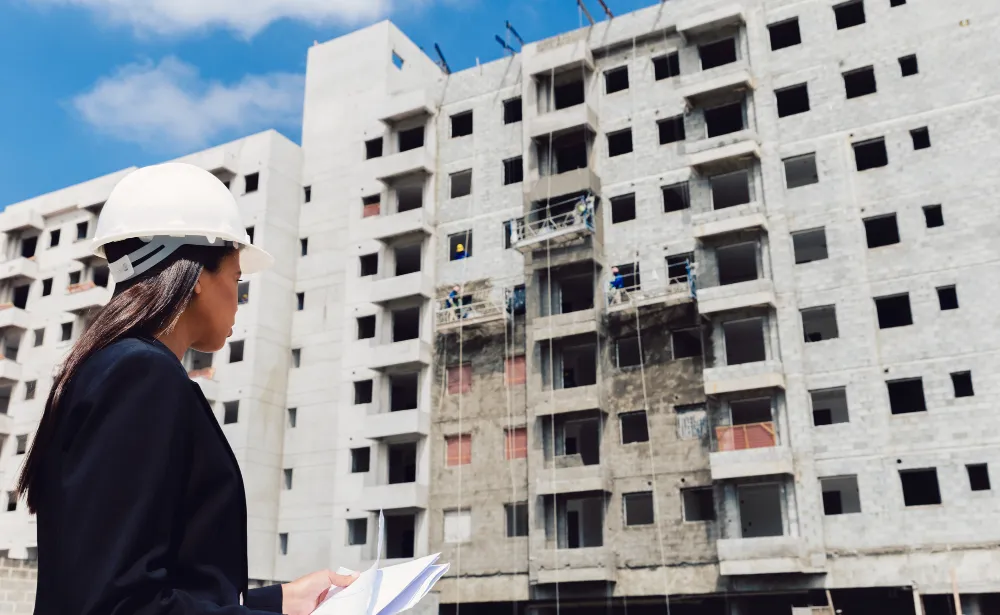Construction Delays: Common Causes, Real Costs & How to Prevent Them
You're staring at your project timeline, and it's slipping through your fingers like sand. That shopping center you promised would open by Q3? Now it's looking like Q1 next year. Construction delays aren't just frustrating they're bleeding your budget dry and crushing your reputation. But here's the thing: most delays are totally preventable if you know what you're up against.
What Are Construction Delays Costing You Right Now?
Construction delays increase project costs by an average of 20%. Let that sink in. On a $5 million project, you're looking at an extra million bucks out the door. But the real damage goes way deeper than your bottom line.
When projects drag on, you're paying premium rates for equipment rentals that were supposed to be returned weeks ago. Your subcontractors are juggling other jobs and charging overtime to fit you back into their schedule. Material costs keep climbing while you're stuck waiting for permits or dealing with labor shortages. And don't even get me started on the hit to your reputation when clients start posting about your missed deadlines on every construction forum from here to Silicon Valley.
According to industry data, 72% of construction project managers experience delays regularly. That means if you're running a project right now, there's a better than even chance you're already behind schedule or about to be. In 2022 alone, construction jobs were delayed an average of 46 days. That's nearly two months of lost time, inflated costs, and headaches you don't need.

Understanding the Types of Construction Delays
Not all delays hit your wallet the same way. Critical delays directly impact your completion date and push back everything downstream. These are the schedule killers that extend your timeline and trigger penalty clauses. Non-critical delays affect specific tasks but don't necessarily move your final deadline because they have buffer time built in.
Then there's the question of who's responsible. Excusable delays are beyond anyone's control think hurricanes, earthquakes, or unexpected site conditions. These typically qualify for time extensions under force majeure clauses. Non-excusable delays? Those are on you or your contractor, whether it's poor planning, late mobilization, or failing to get permits on time.
The ones that really sting are compensable delays. These happen when the owner causes setbacks through slow approvals, design changes, or failing to provide site access. You might be entitled to both extra time and money for these. Document everything, because proving causation is where most delay claims fall apart.
The Top 7 Causes of Construction Delays (And What They're Really Costing You)
1. Labor Shortages — Your Biggest Headache in 2025
Here's the brutal truth: there aren't enough skilled workers to go around. The recession from years back pushed experienced tradespeople into other industries, and guess what? They're not coming back. Meanwhile, younger workers aren't exactly lining up to swing hammers in the heat.
The real impact: When your drywall crew doesn't show up because they got pulled to another project, everything behind it stops dead. Painters, electricians, flooring installers — they're all sitting around burning daylight. One missing crew can cascade into weeks of delays.
Your solution: Partner with a staffing solution that actually understands construction timelines. FlexCrew USA specializes in getting you reliable, skilled workers exactly when you need them — not three weeks later when your schedule's already toast. We've built relationships with experienced tradespeople who show up ready to work, not ghost you on Monday morning.
2. Budget Blowouts — When Your Numbers Don't Add Up
Getting your estimate wrong isn't just embarrassing. It's a project killer. When you run out of money halfway through, everything screeches to a halt while you scramble for additional funding or renegotiate contracts.
The domino effect: Budget issues force you to delay material purchases, which pushes back installation dates, which means subcontractors have moved on to other jobs. Before you know it, you're three months behind and paying premium prices for rush orders.
3. The Approval Waiting Game — Death by Paperwork
Every project manager knows this nightmare. You're ready to pour concrete, but you're stuck waiting for someone to sign off on change orders. Or permits are sitting on some inspector's desk while your crew burns through their coffee budget.
Speed kills (delays): The faster you can get approvals moving, the less time you waste. Set up clear communication channels and make sure decision-makers know they need to respond within 24-48 hours, not next week. Use project management software that sends automatic alerts when approvals are pending. Better yet, establish approval workflows upfront so everyone knows exactly who signs off on what and how long they have to do it.
4. Subcontractor Juggling Acts — When Everyone's Spread Too Thin
Your electrical sub is bouncing between four different job sites. Your HVAC contractor shows up three days late because another project ran long. Sound familiar?
The coordination nightmare: Construction is like a symphony — every player needs to hit their cue at exactly the right time. When one sub misses their window, it throws off the entire schedule. Plus, if they're non-compliant with licensing or bonding requirements, you're looking at potential legal headaches on top of delays.
5. Communication Breakdowns — The Silent Project Killer
When the field team doesn't know about design changes and installs the wrong fixtures, that's not just a mistake. That's wasted labor, materials, and time tearing it all out and starting over.
The real cost: Poor communication doesn't just delay projects — it creates expensive rework that eats into your margins. Make sure everyone from the owner to the guy hauling materials knows what's happening in real-time.
6. Weather and Force Majeure — The Only Excuse That Actually Works
You can't control Mother Nature. Heavy rain, extreme heat, hurricanes — these are legitimate reasons for delays. But smart contractors know how to minimize the impact.

Plan for the unpredictable: Build weather contingencies into your timeline from day one. If you're in Florida during hurricane season or Minnesota in winter, you know what you're dealing with. Schedule accordingly and have backup plans for indoor work when outdoor conditions go south.
Weather-related delays are typically excusable under most contracts, but you still need documentation. Track daily weather conditions, take photos of flooded sites or snow-covered equipment, and maintain detailed logs of which activities couldn't proceed. The difference between an accepted weather delay and a dispute often comes down to whether you can prove the weather actually prevented work.
7. Supply Chain Disruptions — When Your Materials Are MIA
That custom millwork you ordered? It's sitting in a warehouse in Seattle waiting for a truck driver. Your steel beams? Delayed at the port. Supply chain issues have become the new normal, and they're crushing project timelines.
Stay ahead of deliveries: Order materials earlier than you think you need them. Build relationships with multiple suppliers so you're not dependent on one source. And for the love of all that's holy, track your shipments like a hawk.
The smartest contractors are ordering critical materials 30-60 days earlier than pre-pandemic timelines required. Yes, it ties up cash flow and requires more storage space. But it beats having a full crew standing around with nothing to do because your drywall didn't show up. Consider the cost of idle labor versus early material purchases — early ordering wins every time.
How FlexCrew USA Keeps Your Projects Moving Forward
Look, we get it. You've got enough problems without worrying about whether your crew's going to show up tomorrow. That's where FlexCrew USA comes in.
Here's what we bring to your job sites:
Reliable skilled labor when you need it: No more crossed fingers hoping your regular crew can make it. We maintain a network of vetted, experienced construction workers ready to deploy.
Flexible staffing solutions: Need to scale up for a big push? We've got you. Project winding down? No problem. You only pay for the workers you actually need.
Fast deployment: We're talking days, not weeks. When you've got a delay and need to make up time, speed matters.
Pre-screened professionals: All our workers are background-checked, drug-tested, and verified for the skills they claim. No surprises, no drama.
Real talk from the field: One general contractor we work with was facing a six-week delay because his framing crew got pulled to another project. We had a full replacement crew on-site within 48 hours. They not only caught up the schedule but finished three days early. That's the difference reliable staffing makes.
Your Action Plan to Prevent Construction Delays
Let's get practical. Here's what you need to do starting Monday morning:
Week 1 priorities:
- Review your current project schedules and identify potential bottlenecks
- Establish backup suppliers for critical materials
- Set up a communication protocol with response time requirements
- Connect with FlexCrew USA to discuss your upcoming labor needs
Ongoing practices:
- Hold weekly coordination meetings with all subs (no excuses)
- Track material deliveries like your profit margin depends on it (because it does)
- Keep detailed documentation of every delay and its cause
- Maintain a buffer in your timeline for the unexpected
Emergency response:
- Have FlexCrew USA's number saved for when labor shortages hit
- Know which tasks can be done in parallel to make up time
- Keep a list of pre-qualified subs who can jump in quickly
The difference between contractors who finish on time and those who don't comes down to preparation. When delays hit, you need to know exactly who to call and what moves to make. That means building your network before problems arise, not scrambling when you're already three weeks behind.
Documenting Construction Delays: Your Legal Safety Net
If you're not documenting delays as they happen, you're gambling with your company's money. Keep detailed daily logs showing what work got completed and what didn't. Take timestamped photos of site conditions. Save every email, text message, and change order.
Track weather reports for specific dates when work stopped. Document delivery delays with receipts and shipping confirmations. Note which subcontractors failed to show up and when. If disputes turn into lawsuits or you need to file a delay claim, this documentation is your only defense.
Most contractors learn this lesson the hard way. They lose tens of thousands in delay claims because they can't prove what actually happened on specific dates. Don't be that contractor. Make documentation part of your daily routine, just like your safety walks and progress photos.
The Bottom Line
Construction delays are going to happen. But they don't have to destroy your timeline and your budget. The contractors who consistently finish on time aren't lucky — they're prepared. They've got reliable partners, solid processes, and backup plans for when things go sideways.
Don't let labor shortages or scheduling nightmares be the reason your next project misses its deadline. FlexCrew USA has your back with the skilled workforce you need, exactly when you need them.
Ready to stop fighting fires and start finishing projects on time? Contact FlexCrew USA today and let's talk about keeping your crew fully staffed and your projects on schedule. Because in construction, time really is money — and we help you save both.
Frequently Asked Questions About Construction Delays
Q. What is considered a construction delay?
A. Any event pushing your completion date beyond the original schedule, ranging from days to months. Delays are either excusable (weather, permits) or non-excusable (poor planning, contractor errors).
Q. What are the most common causes of construction delays in the U.S.? A.Labor shortages, budget miscalculations, slow permit approvals, subcontractor scheduling conflicts, poor communication, weather, and supply chain issues. Labor shortages hit hardest from New York to California.
Q. How can I prevent labor-related construction delays?
A. Partner with FlexCrew USA for reliable skilled workers on short notice. Maintain good crew relationships through fair pay and respect. Build backup labor networks before you need them.
Q. Are weather delays excusable under construction contracts?
A. Yes, extreme weather qualifies under force majeure clauses. Document specific conditions and work impacts. Normal seasonal weather (Seattle rain) typically isn't excusable, but hurricanes and blizzards are.
Q. How do I get a construction project back on schedule after delays?
A. Fix the root cause first. Add crews through FlexCrew USA, work extended hours, sequence tasks differently, or run more parallel activities. Sometimes negotiating a revised timeline beats crashing the schedule.
Q. Where can I find reliable construction workers to avoid staffing delays? A. FlexCrew USA provides pre-screened, skilled construction workers nationwide. Quick deployment to your job site keeps projects on track and eliminates labor-related delays.
